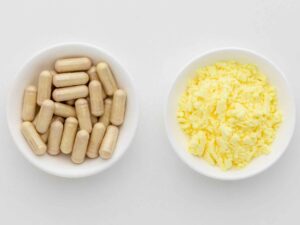In no world can we lead our lives without supplements. From using BCAAs for muscle building to taking megadoses of vitamin B12 to correct deficiencies, many people have used supplements extensively. Ironically, we’re eating supplements when, in fact, we should be eating to not need any supplements! We make major lifestyle choices that affect the type of supplements we eat– such is the case with alpha-lipoic acid. Read more about the benefits, alpha-lipoic acid dosage, and risks of ALA in this article!
Contents
What Is Alpha Lipoic Acid?
 Alpha Lipoic Acid (ALA) hit the market not so long ago and has been the center of attraction among supplements. ALA is a powerful antioxidant and a naturally occurring fatty acid that is beneficial in the treatment of diabetes and neurodegenerative diseases. ALA even assists some powerful antioxidants like vitamin C and vitamin E in various reactions. It is a naturally occurring compound that is produced in small amounts by the body. It is also found in some foods, such as spinach and broccoli.
Alpha Lipoic Acid (ALA) hit the market not so long ago and has been the center of attraction among supplements. ALA is a powerful antioxidant and a naturally occurring fatty acid that is beneficial in the treatment of diabetes and neurodegenerative diseases. ALA even assists some powerful antioxidants like vitamin C and vitamin E in various reactions. It is a naturally occurring compound that is produced in small amounts by the body. It is also found in some foods, such as spinach and broccoli.
Studies
There have been several studies on ALA, and most of these studies support the use of this supplement. One study has shown that taking ALA could increase your BMR i.e. the number of calories you burn at rest by actively involving in fat-burning reactions. On the other hand, many studies have proved that eating ALA might help you in losing weight. For instance, people who took ALA for 14 weeks lost an average of 1.52 pounds, while those who took it for 23 weeks lost an average of 2.8 pounds. However, some studies showed there was no effect on waist circumference whatsoever.
At the end of the day, you have to experiment to see what suits best to your body.
Alpha Lipoic Acid Dosage
ALA supplements are often used to increase levels of this important compound in the body. Research suggests that ALA may help to protect cells from damage, and reduce inflammation. When it comes to dosage, there is no one-size-fits-all answer, as the amount of alpha lipoic acid that each person needs will vary depending on their individual health condition and goals.
While ALA is considered safe, it’s always best to have a word with your healthcare provider. However, a general starting point is 200-1200 mg per day. Often these supplements are sold in tablets or capsules and can be taken with food or water. If you are taking an alpha-lipoic supplement for diabetes, it is important to work with your doctor to determine the best dosage for you, as too much alpha-lipoic acid can lower blood sugar levels.
Benefits Of Taking ALA
Some potential benefits associated with taking ALA supplements include:
- Improved blood sugar control:- Stable blood glucose levels have been shown to improve the overall health of the body, so maybe ALA might work fine for you.
- Reduced inflammation:- Inflammation is one of the worst human enemies, but ALA could reduce inflammation and might prevent several diseases.
- Protection against nerve damage:- Wrecking your nerves is a nightmare. ALA has been shown to reduce damage to nerves.
- Improved cognitive function:- Good news for parents, children with ADHD might improve their cognitive function by supplementation with ALA.
- Reduced signs of aging:- In your 50s and worrying about what to do for your skin, well ALA should be on your list given the fact that it reduces aging.
- Enhanced detoxification:- Bored of drinking detoxifying drinks, you could try ALA for a change as it has detoxifying action.
Additionally, ALA has been shown to promote nerve health and improve cognitive function. Studies suggest that they might also help with type 2 diabetes, and improve insulin sensitivity.
Risks Of Taking ALA
 If you are considering taking alpha lipoic acid supplements, it is important to be aware of the potential side effects. While alpha lipoic acid is generally considered safe, there have been some reports of side effects including stomach upset, skin rash, and headache.
If you are considering taking alpha lipoic acid supplements, it is important to be aware of the potential side effects. While alpha lipoic acid is generally considered safe, there have been some reports of side effects including stomach upset, skin rash, and headache.
More serious side effects have also been reported, though these are rare. These include allergic reactions, low blood sugar levels, and kidney problems. Stop taking the supplement and consult your doctor immediately if you experience any of these side effects after taking alpha lipoic acid.
Precautions
Not enough studies have been demonstrated in children and need conclusive evidence. Therefore, it is not recommended for children. Like many other supplements, ALA should not be taken by women who are expecting, nursing, or breastfeeding as it could interfere with the placenta and cause life-threatening problems. The effects of ALA in these categories are only partially understood because of a lack of studies. If you are planning to take this supplement, do consider talking to your healthcare provider for more information.
Conclusion
All in all, the alpha lipoic acid dosage is generally considered 300-600mg and is a relatively safe supplement. It offers a wide range of potential benefits. However, as with any supplement, it’s important to be aware of the potential risks and side effects before taking it. Be sure to speak with your healthcare provider if you are taking ALA for diabetes. Prevention is better than cure.
Consider contacting Mantra Care for additional information on diabetes care. With the support of our Diabetes Control Program. You can also get in touch with their nutrition experts through our online nutrition counseling, who can guide you through the process and help you achieve your fitness goals.


